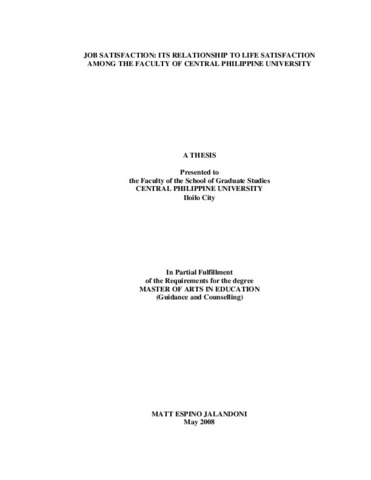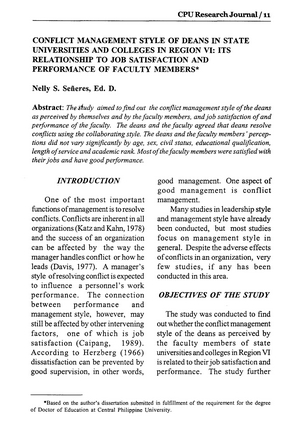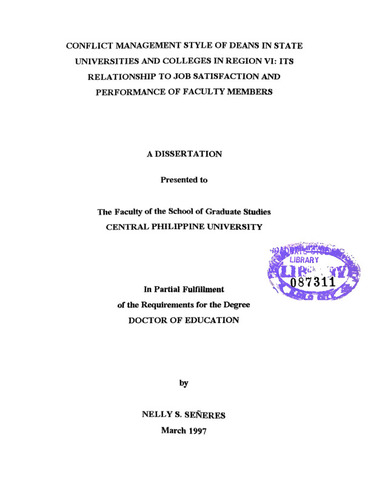Job satisfaction: Its relationship to life satisfaction among the faculty of Central Philippine University

Page views
1,240Date
2008Author
Thesis Adviser
Defense Panel Chair
Share
Metadata
Show full item record
Abstract
This study was designed to find the relationship between some factors and job satisfaction and life satisfaction of the teaching personnel of Central Philippine University in Iloilo City. Furthermore, it aimed to find the relationship between job satisfaction and life satisfaction.
The respondents of the study consisted of 172 randomly selected full-time faculty members of the university coming from the twelve academic programs who have been serving the institution for at least two years. The list of full-time faculty was taken from the university’s Human Resource Department (HRD).
This study is descriptive and correlational in nature. It utilized the one-shot survey design. The variables considered in this study were: age, sex, civil status, length of service, salary job satisfaction and overall life satisfaction and the four domains (health and functioning, social and economic, psychological spiritual, family) of the respondents. To gather the data needed for the study, the researcher used three types of questionnaires: the Job Satisfaction Questionnaires, the Quality of Life Index (QLI) and the Personal Information Questionnaire. The data were coded, encoded and analyzed by computer using the Statistical Package for Social Sciences (SPSS ®11.0 for Windows®) program.
In consonance with the objectives of the study, it was hypothesized that there is no significant difference in the job satisfaction and the overall quality of life satisfaction and the four domains (health and functioning, social and economic, psychological / spiritual, family) of the faculty when they are classified according to age, sex, civil status, length of service and salary. Furthermore it was hypothesized that there is no significant relationship between the following factors, namely; age, length of service, salary and the job satisfaction level, overall life satisfaction level of the faculty in the following four domains: health and functioning, social and economic, psychological/spiritual, family.
Major Findings
The majority of the respondents were married, female, 26 to 35 years old, have been working in the university for at least ten years and had an average monthly salary of Php 14,000. A large portion of the faculty members were satisfied with their jobs and were moderately satisfied with their overall quality of life. It was noted that the female faculty members were more satisfied compared to the male faculty members.
Large portions of the faculty members were very satisfied with their life, mentally and spiritually. Most of them were very satisfied with their family life; with regard to their health and functioning, most were moderately satisfied and their social and economic life reveal that almost one half were moderately satisfied.
The job satisfaction level of the respondents does not differ significantly when they were grouped according to age, sex, civil status and length of service. On the other hand, their levels of job satisfaction significantly differed according to their salary level. In other words, monthly pay differentiates the faculty members. Faculty members earning at least Php 13,000 and those earning Php 18,001 and more differ significantly with their job satisfaction.
The overall quality of life of the faculty members did not differ significantly according to age, civil status, length of service and salary. On the other hand, their levels of overall quality of life satisfaction significantly differed according to sex. In other words, being male or female showed significant difference in the level of overall life satisfaction. The female faculty members were more satisfied compared to the male with regard to the overall quality of life satisfaction. The levels of satisfaction in the area of health and functioning did not differ significantly when faculty members were grouped according to age, civil status, length of service and salary. However, when they were grouped according to sex, a significant difference in their level of satisfaction in the area of health and functioning was found. In other words, the male or female faculty members differ significantly in their level of satisfaction in the area of health and functioning. The female faculty members were more satisfied with regard to their health and functioning satisfaction compared to the male faculty members.
The area of social and economic satisfaction of the faculty members did not differ significantly according to age, civil status, length of service and monthly salary. The variable sex reveals a significant difference in the social and economic satisfaction among the respondents. In other words, being male or female made a significant difference in the level of social and economic satisfaction. The female faculty members were more satisfied with regard to their social and economic satisfaction compared to the male faculty members.
Psychological/spiritual satisfaction of the faculty members did not differ significantly according to age, civil status, length of service and salary. The variable sex reveals a significant difference in the psychological/spiritual satisfaction among the respondents. In others words it does not matter whether one is young or old, single, married or widowed / separated, working in the university for at least 10 or more years and earning at least Php 13,000 or more do not make significant difference in the psychological/spiritual satisfaction. On the other hand, being male or female showed a significant difference in their psychological/spiritual satisfaction. The female faculty members were more satisfied compared to the male with regard to their psychological spiritual satisfaction.
Satisfaction with family among the faculty members did not differ significantly according to age, length of service and salary, but it significantly varied according to sex and civil status. In other words, irrespective of age, length of service and income, family satisfaction of the respondents was favorable. On the other hand, sex and civil status made a significant difference in their family satisfaction. The female, married faculty members were more satisfied with regard to their family satisfaction.
No significant relationship was found between the faculty’s job satisfaction and the variables: age, length of service and salary. These variables just mentioned do not determine job satisfaction.
The overall life satisfaction of the faculty members and the satisfaction level in the four domains (health and functioning, social and economic, psychological/spiritual, family) had no significant relationship with age, length of service and salary of the faculty. These variables do not determine the faculty’s overall quality of life satisfaction and the satisfaction level in the four domains. The overall quality of life satisfaction and the four domains (health and functioning, social and economic, psychological/spiritual, family) of the faculty members determine their job satisfaction, implying that the higher the overall life satisfaction and the satisfaction level in the four domains, the higher also the job satisfaction of the faculty. An analysis of the regression coefficient of the five antecedent variables on job satisfaction and overall quality of life satisfaction and the four domains shows that being female is the only good predictor of job satisfaction and overall quality of life satisfaction. In addition, being married is also a good predictor of overall quality of life satisfaction. It is also worth mentioning that being single or married is also a good predictor of health and functioning satisfaction. In addition, being single is also a good predictor of social and economic satisfaction. With regard to family satisfaction, being married stand out as a good predictor of this particular domain.
Conclusions
In the light of the findings of this study, the following conclusions are drawn:
The job satisfaction level of the faculty members differs significantly when they were classified in terms of salary. Those earning Php 18,001 and more have a greater job satisfaction than those earning less. In other words, a faculty’s monthly pay has a significant bearing on his/her job satisfaction.
The overall quality of life satisfaction level of the faculty members differs significantly when they were grouped according to sex. The female faculty members were more satisfied compared to the male with regard to the overall quality of life satisfaction. In other words, being male or female has a significant bearing on overall life satisfaction.
The health and functioning satisfaction level of the faculty members differs significantly when grouped according to sex. The female faculty members were more satisfied with regard to their health and functioning satisfaction compared to the male faculty members. Implying that being male or female, have a significant bearing on health and functioning satisfaction.
The social and economic satisfaction level of the faculty members differs significantly when the respondents were grouped according to sex. The female faculty members, were more satisfied with regard to their social and economic satisfaction compared to the male faculty members. In other words, being male or female has a significant bearing on the social and economic satisfaction of the faculty members.
The psychological/spiritual satisfaction level of the faculty members differs significantly when the respondents were grouped according to sex. The female faculty members were more satisfied compared to the male with regard to their psychological / spiritual satisfaction. In other words, being male or female has a significant bearing on their psychological / spiritual satisfaction.
The family satisfaction level of the faculty members differs significantly when the respondents were grouped according to sex and civil status. The female, married faculty members were more satisfied with regard to their family satisfaction compared to the single, male faculty members. In other words, being male or female, single or married have a significant bearing on family satisfaction.
There is a significant relationship between job satisfaction and the overall quality of life satisfaction and the satisfaction level in the four domains (health and functioning, social and economic, psychological /spiritual, family) of the faculty members. In other words, job satisfaction has a significant bearing on life satisfaction.
The female faculty members’ job satisfaction and overall quality of life satisfaction differ significantly from the males. This means that the job satisfaction and overall quality of life satisfaction were in a way determined by sex, be it male or female.
Recommendations
The foregoing findings and conclusions lead to the following recommendations:
The female faculty members are more satisfied with their health and normal body functioning as compared to the male. The women are also more satisfied compared to the men when it comes to the emotional support they get from their family. It is therefore recommended that Central Philippine University should pay more particular attention to the health of the male faculty by reviewing the current health care programs and see if it can include other medical procedures and test (cholesterol level, fasting blood sugar level, occult blood test and prostate specific antigen level) design for early detection and prevention of certain diseases. In addition, the university should look into the emotional needs of the male faculty through programs designed to enhance family relationship.
The married faculty members are more satisfied with their health and normal body functioning as compared to the single, widowed / separated. They are also more satisfied as compared to the single, separated / widowed ones when it comes to their significant others. In addition, they are also more satisfied with the emotional support they get in being in a relationship compared to the single, separated and widowed ones. It is therefore recommended that Central Philippine University should look after the emotional needs of the single, separated and widowed faculty through support systems, programs, privileges and benefits designed to improve their quality of life.
The faculty members derived much of their overall quality of life satisfaction from their health, friends, job and their ability to take care of themselves and their family responsibilities, particularly the family finances. It is therefore recommended that Central Philippine University should safeguard the health of her faculty members, maintain a positive working environment among her employees and should review the existing pay system to address the changing times. It is recommended that future studies regarding job satisfaction of faculty members should include other variables like motivational level, leadership style, perception of work load, perception of organizational climate, perception of pay system and educational qualification which were not included in this study. In addition, these studies should be wider in scope.
Description
Abstract only
Suggested Citation
Jalandoni, M. E. (2008). Job satisfaction: Its relationship to life satisfaction among the faculty of Central Philippine University (Unpublished Master's thesis). Central Philippine University, Jaro, Iloilo City.
Type
ThesisSubject(s)
Department
School of Graduate StudiesDegree
Master of Education major in Guidance and CounselingShelf Location
GSL Theses 371.4072 J216
Physical Description
xviii,121 leaves
Collections
Related items
Showing items related by title, author, creator and subject.
-
Conflict management style of deans in state universities and colleges in Region VI: Its relationship to job satisfaction and performance of faculty members
Señeres, Nelly S. (Central Philippine University, 1999)The study aimed to find out the conflict management style of the deans as perceived by themselves and by the faculty members, and job satisfaction of and performance of the faculty. The deans and the faculty agreed that ... -
Conflict management style of deans in State universities and colleges in Region VI: Its relationship to job satisfaction and performance of faculty members
Señeres, Nelly S. (1997)The study was conducted to find out whether the conflict management style of the deans as perceived by the faculty members of state universities and colleges in Region VI is related to faculty job satisfaction and performance. ... -
A study of the association of the leadership styles of elementary school principals in the Division of Iloilo as perceived by their teachers with teachers' job satisfaction
Saclauso, Lagrimas Araña (1993)It is the purpose of this study to go into the leadership styles of elementary school principals as seen by themselves and by their teachers. It is hoped that leaders and their subordinates jointly discover ways by which ...




